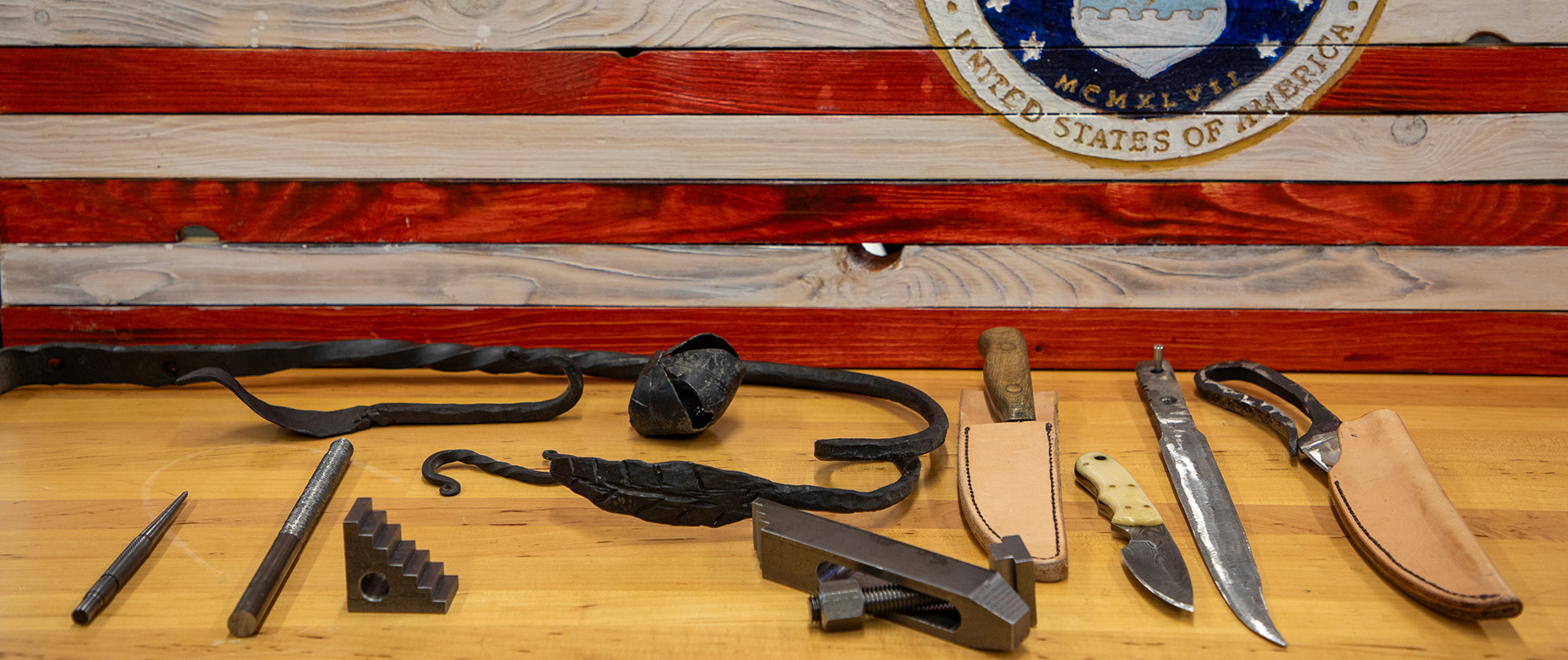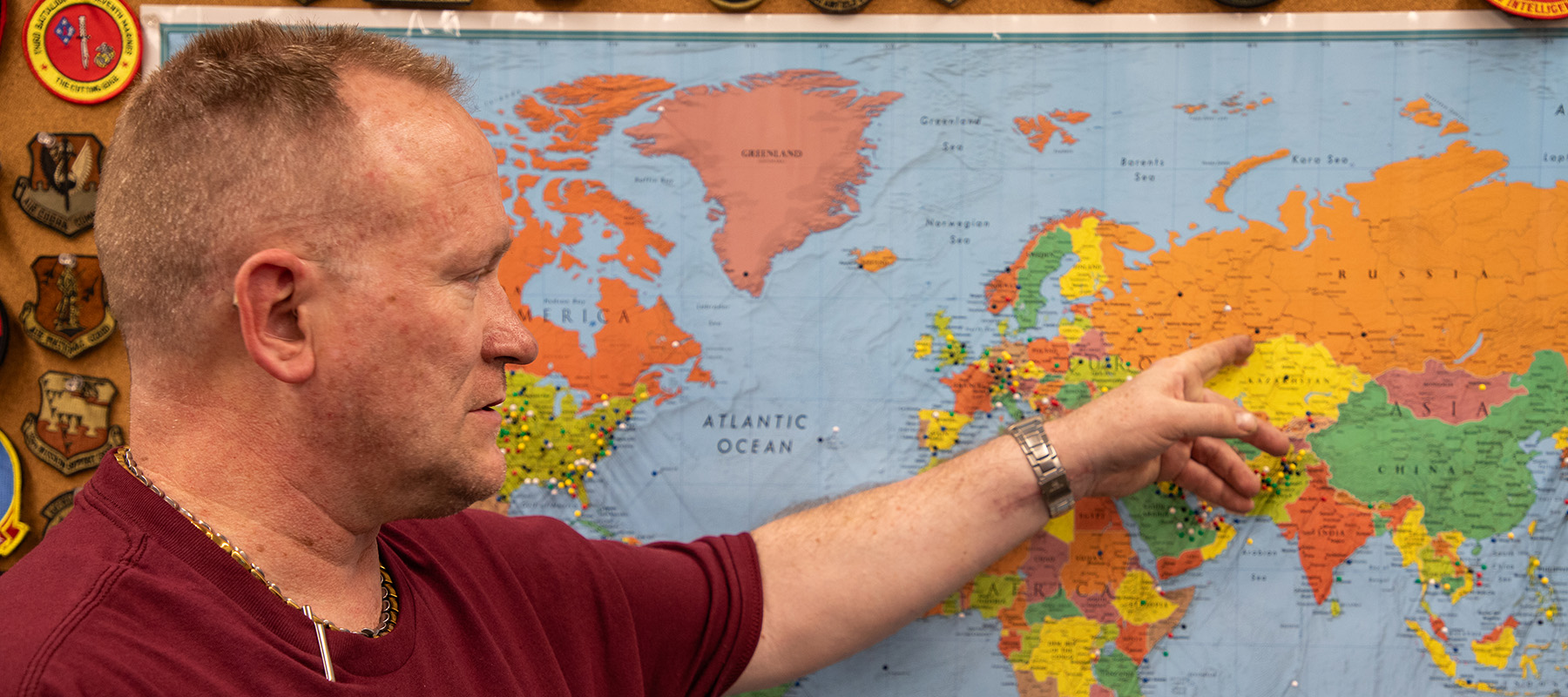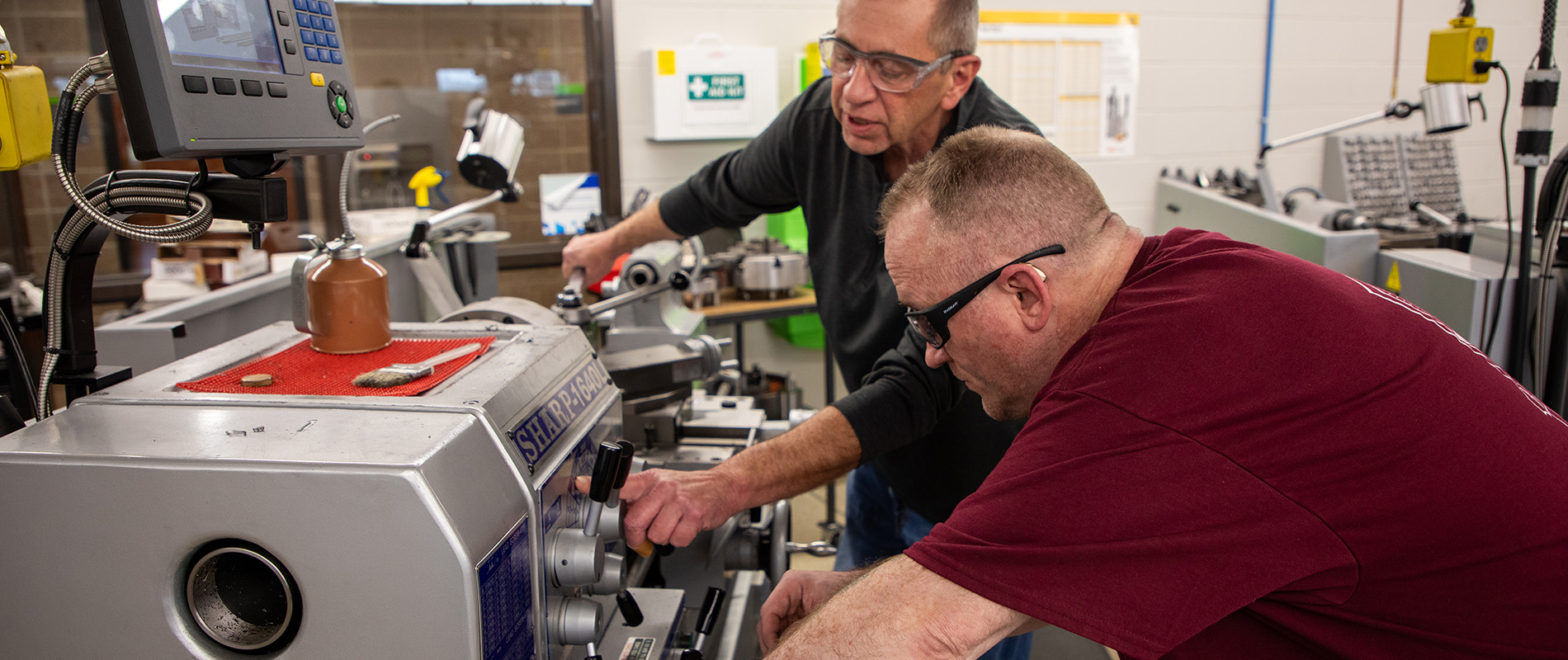FORGING A PATH


Brian Ayers
Media and Public Relations manager | August 12, 2025
FROM MILITARY SERVICE TO BLACKSMITHING
Adam Talkington’s transition from a career in military intelligence to civilian life has been a journey of reinvention, ultimately leading him to Metropolitan Community College’s South Omaha Campus. After dedicating 25 years to service in the Army, Talkington is embracing a new passion — blacksmithing.
As a military veteran, Talkington is taking advantage of free tuition at MCC through Veterans Affairs (VA) and its Veteran Readiness and Employment program. After picking up blacksmithing as a hobby in 2012, he is now pursuing an associate degree in welding from MCC.
From moving frequently in his childhood as a self-proclaimed “military brat” to obtaining a master’s degree in nuclear engineering for various Army assignments, Talkington has spent many years traveling the world and dedicating himself to service. Since retiring in 2017 after spending three years in government service following his career in the Army, he said he has enjoyed the freedom to chase his own passions.
Retirement has provided Talkington with ample time and opportunity to fully immerse himself in metalworking.
“As a blacksmith, I can force metal to do what I want by pounding it in various places,” Talkington said, “and with the machining program here, I can make metal do what I want by taking away material. I guess you can call me a metal head, but a different kind of metal.”
Talkington said he enjoys the release he experiences with blacksmithing in retirement.
“Blacksmithing is relaxing, and there’s a sense of satisfaction that you get with everything that you’re doing because you can see the impact. You can see the effect while you’re doing it. When you make mistakes, there’s a way to fix it,” Talkington said.
Family plays a big role in Talkington’s connection to MCC. His introduction to the trade came through his father-in-law, an expert blacksmith who also teaches noncredit classes at MCC. Although it started with family ties, Talkington said he was drawn to the welding program at the College because of its course offerings and the opportunity to learn from knowledgeable instructors.
His wife, Brigit, is an adjunct communications instructor at MCC, and his five children have all taken noncredit silversmithing classes.
For Talkington, blacksmithing is both a creative and physical outlet — a stark contrast from the high stakes and intensity of his military career.
“[Nuclear engineering required] significant mental effort and limited physical effort. [With blacksmithing] you’ve got physical effort that you’re putting in, and you get immediate feedback. If I’m pounding on a piece of metal and it isn’t going the way it’s supposed to go, I can either fight with it, I can fix it, or I can start over, and it doesn’t mean a thing,” Talkington said.
FINDING SUPPORT IN THE CLASSROOM

Although he is still new to blacksmithing, Talkington dreams of opening his own shop one day. Until then, he enjoys learning about the different metals and techniques that contribute to quality craftsmanship.
“Welding is part of that, machine tooling is part of that and metallurgical studies are part of that,” Talkington said. “MCC offers two of those — the welding and machining. This is a good place to put the skills together to be a better blacksmith.”
To master blacksmithing, Talkington recognizes the importance of welding and machining skills, both of which MCC offers through its credit programs.
“I don’t want to just dip my toe into the welding pool,” Talkington said. “I want to understand it.”
In his classes, Talkington said he enjoys learning how to create both functional and artistic pieces, from knives and tableware to decorative planters, fences and gates. Along with the guidance he receives from MCC instructors, he has also found a mentor in Elmo Diaz, who teaches noncredit blacksmithing classes on behalf of MCC at The Blacksmith Shop of Omaha.
In addition, Talkington said he values the College’s small class sizes, the like-minded community and the hands-on learning from instructors such as John Banark and David Lueders. He appreciates how MCC instructors challenge students while also meeting them at their skill level to ensure their success.
Talkington also finds the collaborative learning environment at the College to be a rewarding way to spend time in retirement. It also creates a positive experience for nontraditional students.
“It’s interesting and fun,” Talkington said. “The classes here are set up so that there’s an expectation of work, but it’s something that I can do for myself, something that I can help others to do, as well. It’s all individual work, but it’s group-minded, so everybody helps each other, and it makes its own little community.”
A COMMUNITY FOR VETERANS
Another reason Talkington chose MCC was its strong support of veterans and the various programs and opportunities available through its Veterans and Military Resource Center (VMRC). Located in the Center for Advanced Manufacturing on the South Omaha Campus, Talkington said he noticed the office when he entered the building. The VMRC is a dedicated space that provides military-connected students with academic and career guidance, assistance with VA resources, counseling, tailored advising and other services.
From a student veterans organization to private study areas and a meditation room complete with a massage chair, the center provides a sense of belonging and camaraderie, allowing students to connect and share their experiences. Daniel Mohr, an Air Force veteran and the Center’s director, said the VMRC staff is committed to helping veterans reach their educational and career goals as they adjust to civilian life. That support extends to veterans’ families, as well.
“This past quarter, we had about 680 military-connected students,” Mohr said. “If you’re a family member, active duty, Guard and Reserve, separated, a veteran — we’re going to help you out.”
The VMRC serves as a welcoming space where veterans can decompress from classes and everyday stressors. Mohr said he and his staff also conduct outreach calls to check in with students and provide assistance when necessary.
Additionally, the VMRC connects veterans with the Veterans Business Outreach Center and programs such as Guitars for Veterans, which helps people impacted by post-traumatic stress disorder and other service-related trauma.
Regardless of students’ backgrounds or aspirations, Mohr said VMRC staff seek to guide them toward the resources they need to achieve their goals.
“If people have the courage to get out of their car and walk in here,” Mohr said, “I’m not going to send them away and say, ‘Come back in a week.’ Instead, we’re going to help them out on the spot.”
Talkington is one of many students who have found a home at the VMRC.
“There’s a lot of good sources of comfort here,” Talkington said. “I can come in here and relax with like-minded people who have similar experiences, and it doesn’t hurt the fact that they offer free snacks and computer access. At least for me, it makes going back to school 20-plus years later more comfortable and more enjoyable.”
Mohr said he aims to provide students with a caring environment and a safe space. He finds it especially gratifying when graduates return to share their updates.
“I love it when students come back and say, ‘Hey, I’m just popping in to see how you’re doing,’ or ‘I just want to tell you what’s going on in my life,’” Mohr said. “It makes me feel like we’ve made a very positive impact.”
A LIFELONG LEARNING MINDSET

MCC supports learning at all stages, whether students are beginning their college journey or returning to education after years away from the classroom. Compared to large university systems, Talkington said he appreciates the community college structure.
Talkington also values the collaboration between the VA and MCC to equip him with the necessary tools for success. This partnership was a key factor in his selection of the College over other institutions.
“It’s like an equal sign,” Talkington said. “The VA and MCC work hand in hand. I looked at what was available for welding other than going to a specific welding school, which I didn’t want to do because I had other things that I wanted to do as well. [MCC] also works for my wife for employment. [MCC] works for my kids. The dynamic just works.”
Talkington said he would not be pursuing further education if the College did not have the classes he needed. He credits MCC and the VMRC for helping him work toward his blacksmithing dream and encourages other military-connected students to take advantage of similar opportunities.
“I’m still new at this,” Talkington said. “I’m new at blacksmithing, I’m new at machining, I’m new at reintegrating with community college, so I’m still learning. Every day is a learning experience, but I would say that if there were any other students like me who want to self-improve through continuous learning, and they’re somehow connected with the military, they should certainly give this a try.”





